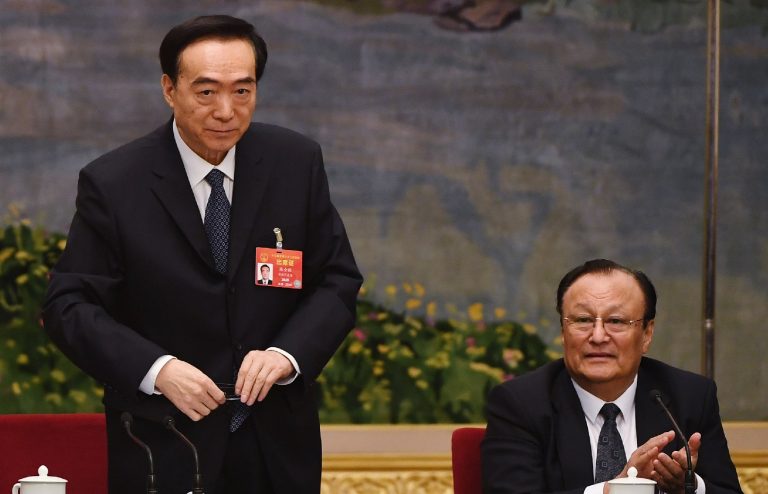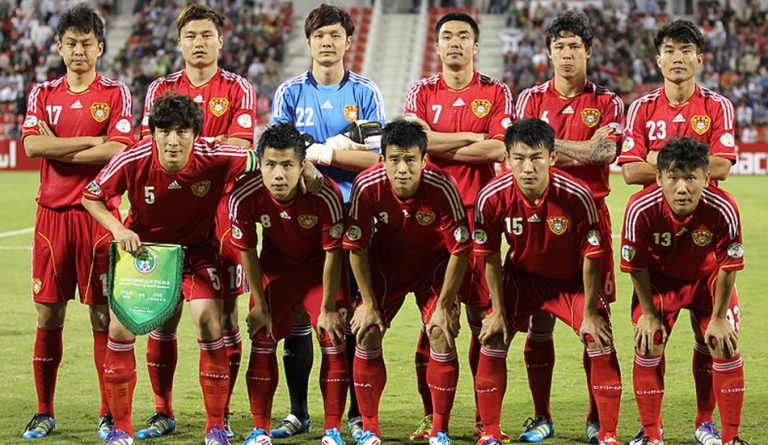News analysis
Sanctioned by the U.S. for his involvement with the mass incarceration and “re-education” of ethnic minorities in China’s Xinjiang region, local Chinese Communist Party (CCP) boss Chen Quanguo would leave his post for “another appointment,” the Party’s mouthpiece Xinhua announced on Christmas.
During his five years running Xinjiang, Chen oversaw a massive intensification of CCP efforts to crack down on Muslim terrorism — by rooting out local minority culture and language in favor of Party-approved “Sinicization.” More than 1 million members of the Turkic Uyghur ethnicity are believed to be held in concentration camps dotting the “autonomous region.”
Chen, 66, has been replaced by Ma Xingrui, an aerospace engineer who previously held leadership roles in the economic powerhouse of Guangdong and the province’s biggest city, Shenzhen.
According to the state-run Xinjiang Daily, the 62-year-old Ma has pledged to “firmly promote continuous and long-term social stability in Xinjiang and never allow any reversal for the hard-won stability,” as Beijing terms the results of its persecution campaign in the region.
Success
You are now signed up for our newsletter
Success
Check your email to complete sign up
SinoInsider, a political risk consultancy specializing in Chinese politics, notes speculation that “the Xinjiang Party secretary reshuffle could mean that Chen was being primed for further promotion, including joining the Politburo Standing Committee at the 20th Party Congress” — an important CCP meeting to be held in late 2022.
‘Softer’ policy on Xinjiang?
According to a Dec. 28 SinoInsider newsletter, “The replacement of Chen Quanguo with Ma Xingrui in Xinjiang appears to be guided by several factors, including Xi Jinping’s third term preparations, major personnel reshuffle at the 20th Party Congress and earlier, and growing international pressure against Xi and the CCP over the persecution of Uyghurs and other ethnic minorities in Xinjiang.”
Dozens of countries have condemned the CCP’s widespread persecution and mass surveillance in Xinjiang; U.S. officials have described Beijing’s abuse and coercive indoctrination of the Uyghurs and other minority groups as a genocide.
“Should he have stayed on in his current post, Chen Quanguo’s continued iron-fisted governance of Xinjiang could court more international pressure for Xi and the CCP,” SinoInsider observes. “Hence, Xi would naturally seek to replace Chen Quanguo the hardliner with someone of milder character like Ma Xingrui the technocrat to signal and facilitate the rollout of ‘softer’ Xinjiang policies.”
However, the consultancy warns, Ma’s appointment to Xinjiang merely represents a tactic by the Communist Party to camouflage its abuse of Chinese Muslim ethnicities, rather than a true shift in policy on the region and its people.
The analysis highlighted a previous example of a persecution that “went to ground,” namely the CCP’s 22-year-long campaign against the Falun Gong spiritual practice, which according to experts served as the “playbook” for Beijing’s strategy to handle Xinjiang.
“the Xinjiang persecution campaign could … become less publicly obvious in a manner similar to how the previously high-profile Falun Gong persecution campaign “went to ground” after 2003,” SinoInsider wrote.
Blunting the intensity of international pressure on the CCP and officials responsible for human rights abuses — a recent U.S. State Department action sanctioned 14 cadres over their involvement with the Xinjiang campaign — is especially important for Xi as he makes a case to secure another term in office come the CCP Congress later this year.
Rivals of Xi in the Chinese regime have plenty to criticize him over, not only the international reaction to the Party’s actions in Xinjiang, but also the real estate crisis, mismanagement of the COVID-19 pandemic, and an increasingly sclerotic economy.
Political infighting
Developments in Xinjiang over the last decade are tied up with factional intrigue in Beijing, namely the struggle between the Xi leadership and the weakened, but still-potent network associated with former CCP boss Jiang Zemin.
SinoInsider highlighted a likely difference between Chen’s career after leaving Xinjiang and that of his predecessor Zhang Chunxian, who also served as CCP secretary of the region for five years, and furthered the communist “Sinicization” of Xinjiang.
While observers expect Chen to obtain a higher post, Zhang did not rise higher in the ranks after leaving his Xinjiang office in 2016, and, according to the consultancy, will likely retire from politics this year.
“Zhang Chunxian’s political stagnation is very likely the result of fierce factional fighting between the Jiang Zemin faction (which Zhang belongs to) and the Xi Jinping camp,” the analysts wrote.
Jiang, who governed China from 1989 to the early 2000s, dominated regime politics until 2012, when Xi came to power. The first several years of Xi’s leadership saw the arrests and sentencing of many officials linked to Jiang, including powerful security officials and military generals.
SinoInsider, focusing on Zhang Chunxian’s likely ties to the Jiang faction, noted a slew of terrorist incidents that occured under his watch, including 10 in 2014 alone.
“There may or may not be any connection between Zhang Chunxian’s factional background and the uptick in terrorist incidents during his tenure. But the Xi camp would definitely suspect Jiang faction’s involvement in some manner (including “lax” maintenance of stability in Xinjiang, not properly following Beijing’s orders, etc.),” the analysis reads.
As a result, Beijing found cause to remove Zhang and replace him with Chen, who had experience running Tibet, another region where Beijing seeks to “transform” the local ethnic group and “Sinicize” their culture. “Chen undoubtedly helped Xi to ‘stabilize’ Xinjiang and thwart whatever plans the latter’s factional rivals could have to ‘transform’ the province into an ‘anti-Xi’ base.”
Two birds with one stone?
However, “Chen’s ‘usefulness’ in Xinjiang is now more of a liability than an asset for Xi in factional struggle,” SinoInsider wrote, given the international backlash of the anti-Muslim campaign.
“Greater international pressure would in turn give the Jiang faction and Xi’s other political rivals another strong reason to block his bid for a norm-breaking third term in office.”
Chen’s future after leaving Xinjiang may hinge on Xi’s strategy for securing his third term as CCP General Secretary at the upcoming Congress. Despite almost a decade of battling with the Jiang faction, the Party continues to purge high-ranking officials associated with the “old leader” and his close ally, former Vice President Zeng Qinghong.
According to SinoInsider, Chen could be freed up to take on an even higher office, possibly replacing current security czar Guo Shengkun. Guo, who is identified as being close to the Jiang faction, might step aside in March 2022.
Some officials under Xi have had peculiar career trajectories. In 2018, Jiang faction-aligned police official Fu Zhenghua was promoted to head of China’s Justice Department, but this “promotion” turned out to be short-lived. In 2020, Fu was retired, and last Oct. 2 was placed under investigation for corruption.
In 2020, Xia Baolong, a “second line” official who many China-watchers believed had reached a dead-end in his career, was suddenly appointed head of the Chinese government’s Hong Kong and Macau Affairs Office. He replaced Zhang Xiaoming, who had long served in the former British colony and is regarded as being part of the Jiang faction.













